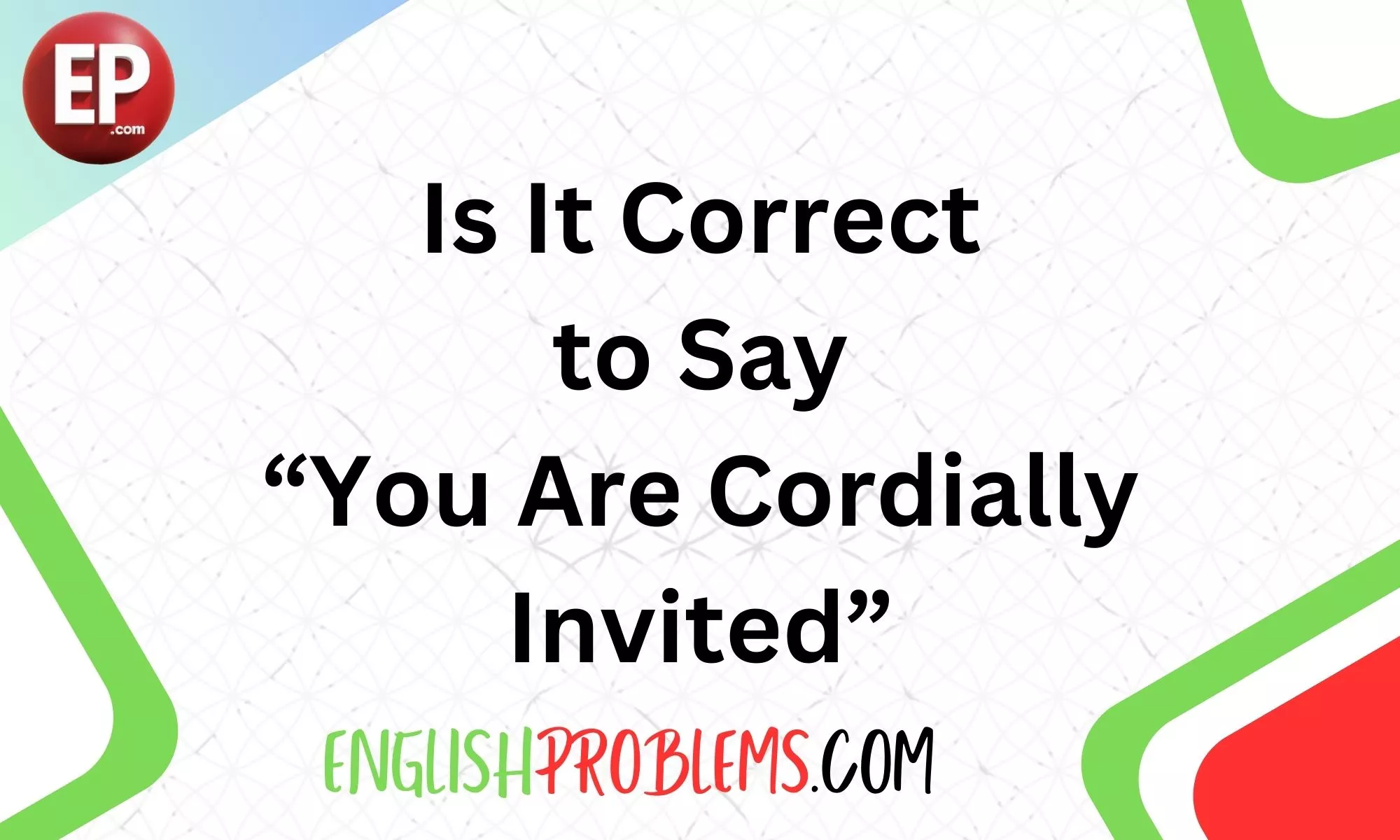In the realm of social etiquette, the way you extend an invitation can set the tone for your entire event. Whether you’re planning a wedding, a professional gala, or a significant milestone celebration, the wording of your invitation is crucial. One phrase often used in formal settings is “You Are Cordially Invited.”
But is this the correct and best way to invite your guests? In this comprehensive guide, we will explore the intricacies of formal invitations, the meaning behind “cordially,” and when it is most suitable to use this phrase.
The Etiquette of Formal Invitations
Historical Context of Formal Invitations
Formal invitations have a long history, dating back to the times when handwritten notes were the norm. Nobles and the elite would send beautifully crafted invitations on fine paper, often hand-delivered by messengers. This tradition emphasized the importance of the event and the honor bestowed upon the guest by being invited.
Key Principles of Invitation Etiquette
When crafting a formal invitation, several principles should be kept in mind:
- Clarity: Ensure the details of the event are clear and unambiguous.
- Formality: Maintain a formal tone throughout the invitation.
- Respect: Show respect to your guests by using polite and courteous language.
Why Wording Matters in Invitations
The wording of an invitation conveys the nature and formality of the event. A well-worded invitation sets the right expectations and reflects the importance you place on your guests’ attendance.
The Meaning Behind “Cordially”
Definition and Origins of “Cordially”
The term “cordially” originates from the Latin word “cordialis,” meaning heartfelt or sincere. It is often used to express genuine warmth and friendliness. In the context of invitations, it adds a touch of formality and earnestness.
How “Cordially” Influences the Tone of the Invitation
Using “cordially” in an invitation can elevate the tone, making it sound more formal and respectful. It suggests that the host genuinely looks forward to the guest’s presence and values their attendance.
Comparing “Cordially” with Other Adverbs in Invitations
Other adverbs like “warmly” or “graciously” can be used in invitations, but each carries a slightly different connotation:
- Warmly: Suggests a friendly and informal tone.
- Graciously: Implies a high level of respect and politeness.
- Sincerely: Conveys honesty and earnestness.
Traditions in Formal Invitations
Historical Evolution of Invitation Wording
Over the centuries, the wording of formal invitations has evolved from elaborate and flowery language to more straightforward and clear expressions. Despite these changes, the core principles of respect and formality have remained constant.
Cultural Differences in Formal Invitations
Different cultures have unique traditions and expectations regarding formal invitations. For example:
- Western Cultures: Emphasize politeness and clarity.
- Eastern Cultures: Often incorporate traditional phrases and symbols.
- Middle Eastern Cultures: Use elaborate and ornate language.
Examples of Traditional Invitation Phrasing
Here are some traditional phrases used in formal invitations:
- “The honor of your presence is requested at…”
- “You are invited to celebrate the marriage of…”
- “We request the pleasure of your company…”
Situations When “You Are Cordially Invited” is Most Suitable
Identifying Appropriate Occasions for Formal Invitations
Formal invitations are suitable for significant and formal events, such as:
- Weddings
- Corporate Galas
- Award Ceremonies
- Formal Dinners
Examples of Events Where “Cordially” Fits Perfectly
Using “cordially” is ideal for events where a formal tone is necessary. Examples include:
- Weddings: “You are cordially invited to the wedding of…”
- Corporate Events: “You are cordially invited to our annual gala…”
- Formal Dinners: “You are cordially invited to a formal dinner hosted by…”
Balancing Formality with the Event’s Nature
While formality is important, it’s also crucial to consider the nature of the event. A formal tone might be necessary for a wedding, but a slightly less formal tone could be appropriate for a casual retirement party.
Grammatical Nuances of the Phrase “You Are Cordially Invited”
Breakdown of the Phrase Structure
The phrase “You are cordially invited” consists of:
- You: Directly addresses the guest.
- Are: Indicates the present tense.
- Cordially: Adds a formal and heartfelt tone.
- Invited: The action being conveyed.
Common Grammatical Mistakes to Avoid
When using this phrase, ensure the following:
- Subject-Verb Agreement: Use the correct tense and subject-verb agreement.
- Punctuation: Use appropriate punctuation to maintain clarity.
- Consistency: Maintain a consistent tone throughout the invitation.
Ensuring Clarity and Correctness in Your Invitation
Clarity is key in formal invitations. Make sure the details are precise, including the date, time, location, and dress code if applicable. Proofread multiple times to avoid any errors.
Appropriate Contexts for Using “You Are Cordially Invited”
Distinguishing Formal from Informal Contexts
Formal invitations should be reserved for events that require a higher level of respect and formality. Informal contexts, like casual parties or informal get-togethers, can use more relaxed language.
Case Studies of Formal Invitations in Various Scenarios
Case Study 1: Wedding Invitation
Event: A traditional church wedding
Invitation Text: “You are cordially invited to the wedding of John Doe and Jane Smith on Saturday, the 15th of September at 2:00 PM at St. Mary’s Church.”
Analysis: The phrase “cordially invited” fits perfectly, maintaining the formal and respectful tone appropriate for a wedding.
Case Study 2: Corporate Gala
Event: Annual corporate gala
Invitation Text: “You are cordially invited to the ABC Corporation Annual Gala on Friday, the 20th of October at 7:00 PM at the Grand Ballroom, Hilton Hotel.”
Analysis: This phrase adds a touch of formality and professionalism suitable for a corporate event.
Tailoring the Phrase to Fit the Event’s Context
Adjust the wording of your invitation based on the event’s context. For example, for a more casual wedding, you might say, “You are warmly invited.”
Professional Events That Call for a Formal Invite
Corporate Events: Meetings, Conferences, and Galas
Formal invitations are essential for corporate events to maintain a professional image. Examples include:
- Meetings: “You are cordially invited to attend our quarterly board meeting.”
- Conferences: “You are cordially invited to the XYZ Annual Conference.”
- Galas: “You are cordially invited to our annual gala.”
Networking Events and Industry Gatherings
Networking events and industry gatherings also benefit from formal invitations to attract and respect participants. For example:
- “You are cordially invited to the Annual Industry Networking Event.”
Professional Ceremonies and Award Presentations
Professional ceremonies and award presentations require a formal tone to honor the achievements being recognized:
- “You are cordially invited to the Awards Presentation Ceremony.”
Celebratory Occasions and Personal Milestones
Weddings, Anniversaries, and Milestone Birthdays
Significant personal milestones deserve formal invitations to highlight their importance:
- Weddings: “You are cordially invited to the wedding of…”
- Anniversaries: “You are cordially invited to celebrate our 25th anniversary…”
- Birthdays: “You are cordially invited to a milestone birthday celebration…”
Graduation Parties and Retirement Celebrations
Celebrating educational and career achievements also calls for formal invitations:
- Graduation Parties: “You are cordially invited to celebrate John’s graduation…”
- Retirement Celebrations: “You are cordially invited to a retirement celebration for…”
Holiday Gatherings and Family Reunions
Formal invitations can add a special touch to holiday gatherings and family reunions:
- Holiday Gatherings: “You are cordially invited to our annual holiday party…”
- Family Reunions: “You are cordially invited to the Smith Family Reunion…”
Alternative Ways to Extend a Formal Invitation
Synonyms for “Cordially” and Their Connotations
Using synonyms for “cordially” can add variety to your invitations while maintaining formality. Here are some examples:
- Graciously: Implies high respect and politeness. E.g., “You are graciously invited…”
- Sincerely: Conveys honesty and earnestness. E.g., “You are sincerely invited…”
- Warmly: Suggests a friendly and informal tone. E.g., “You are warmly invited…”
Modern vs. Traditional Invitation Language
While traditional language emphasizes formality, modern invitations can balance respect with a more casual tone:
- Traditional: “The honor of your presence is requested…”
- Modern: “We would love for you to join us…”
Creative Phrasing to Add a Personal Touch
Personalize your invitations by incorporating creative phrasing that reflects your personality and the event’s nature:
- “Join us for an unforgettable evening as we celebrate…”
- “We would be delighted to have you at…”
Synonyms for “Cordially” in Invitations
List of Synonyms and Their Appropriate Contexts
Here are some synonyms for “cordially” and when to use them:
| Synonym | Appropriate Contexts |

Lucy Wright combines her academic background with a flair for simplifying the intricate details of grammar. Her practical advice and clear explanations empower readers to improve their writing skills and grasp challenging concepts effortlessly.










